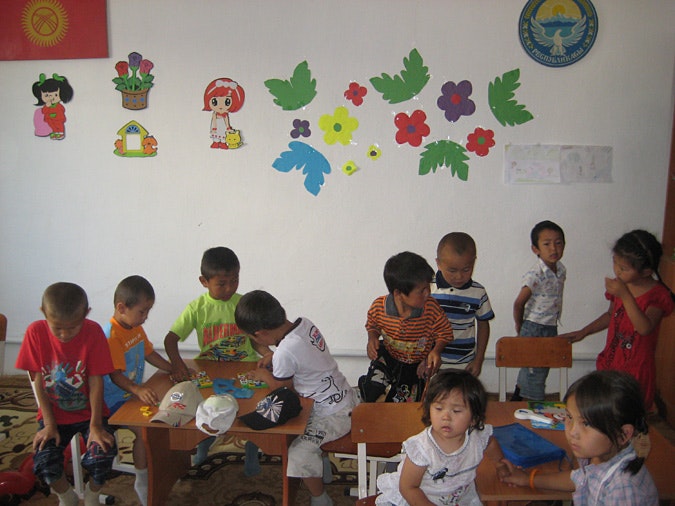Social Entrepreneurship and Education in Kyrgyzstan
By Nurlan Djakubov & Aida Alymbaeva

There is not a single kindergarten in Archa Beshik. This district of Kyrgyzstan’s capital city is home to an estimated 50,000 people, many of whom are young families raising two or three children. There are two primary schools, but neither has the capacity to educate all of Archa Beshik’s children.
Archa Beshik grew from waves of internal migration that began in the early 1990s. People from all corners of Kyrgyzstan moved to Bishkek in search of jobs. The migrants settled here building homes with the materials they could find, and making do without running water or electricity. Over time things have slowly improved in Archa Beshik; however, the community is still lacking schools.
This summer saw a promising sign of change. In June, the community had an official opening ceremony for the Aikol Children’s Development Center. The brainchild of Nuriya Temirova and Gulnara Shukeeva, the center provides classes for children from vulnerable families in Archa Beshik. The women decided to establish the Aikol Children’s Development Center after Nuriya attended a program on social entrepreneurship in Poland. The program, run by the Social Research Center at the American University of Central Asia, brings together promising leaders from NGOs in Kyrgyzstan with social entrepreneurs in Poland to exchange ideas and experiences. It is supported by Open Society Foundations in Kyrgyzstan and Poland as well as the East East: Partnership Beyond Borders Program.
Once Nuriya returned to Kyrgyzstan the pair got to work. They set up the center in an office building. They acquired bookcases, tables, and chairs from a local education project funded by USAID. And they enlisted members of the community to donate classroom supplies and toys for the children.
The opening ceremony was a remarkable event. It was attended by community members, NGO representatives, donor organizations, local authorities, and—most important of all—happy children and their parents. Children performed song and dance, and local residents used stones to write tynchtyk (peace) in front of the center.
Today, fifteen children from the ages of three to six years old attend four hours of daily classes at the Aikol Children’s Development Center. Tutors help the children play games, read, and count. The center is planning to recruit a second group of children and hopes to insulate the building in time for winter.
The time Nuriya spent in Poland learning about social entrepreneurship has made a real impact on the lives of Archa Beshik’s youngest inhabitants. What began as an exchange of ideas culminated in the creation of a children’s center; a vision became real change.
Until February 2014, Nurlan Djakubov was the program coordinator of the East-East: Partnership Beyond Borders Program at the Soros Foundation–Kyrgyzstan.
Aida Alymbaeva is the director of Social Research Center at the American University of Central Asia.